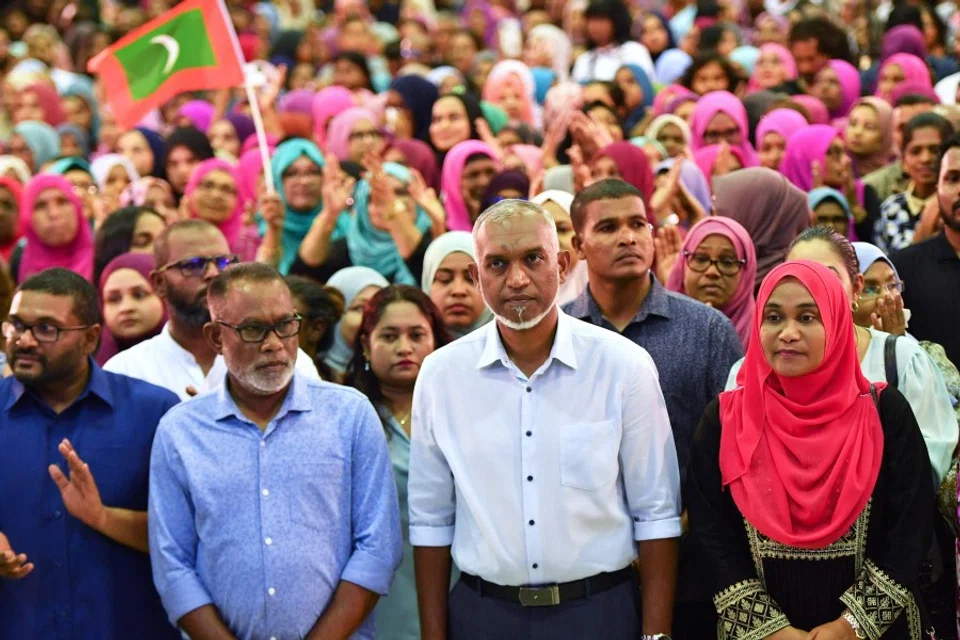Chinese academic: Will the new Maldives government shift from 'India first' to pro-China?
Following the recently concluded presidential election in the Maldives, the global community is observing how its foreign policy might change, particularly vis-a-vis India and China. Does having good relations with one side necessarily come at the expense of relations with the other? Chinese academic Guo Bingyun looks into the issue.

The Maldives presidential elections which ended on 30 September drew global attention. That day, the Times of India published an article titled "Pro-Beijing Frontrunner Wins Maldives Presidential Polls as India, China Influence Takes Centre Stage"; The New York Times ran an article titled "Maldives President Is Defeated, in Vote Overshadowed by India and China".
On 1 October, the Washington Post published an article headlined "In Blow to India, Pro-China Candidate Wins Maldives Election". On 3 October, the Associated Press ran an article with the headline "Maldives President-elect Says He's Committed to Removing the Indian Military from the Archipelago". On 4 October, Reuters released an article titled "Foreign Troops Must Leave Maldives, President-elect Muizzu Says".
... the intensification of great power competition has magnified the impact of small countries' diplomatic choices.
From 'India First' to pro-China?
The Maldives is a small South Asian nation comprising over 1,000 islands with a land area of just under 300 square kilometres and a population of around 520,000. Why would the presidential election of such a low-profile country attract the attention of major global media outlets?
On the one hand, the intensification of great power competition has magnified the impact of small countries' diplomatic choices. China-US and China-India strategic competition has escalated regionally and globally. Consequently, India and the West are closely monitoring any potential shifts in diplomatic policy resulting from the presidential election in the Maldives.

If the West together with India cannot curb China's growing influence in the Indian Ocean, it would undoubtedly be perceived as a significant diplomatic failure by this alliance. Western media, accustomed to the Cold War mentality, may inevitably view the potential diplomatic implications of the Maldives presidential election through a zero-sum paradigm.
On the other hand, since Maldives held its first multi-party presidential elections in 2008, successive Maldivian governments have had varying stances on India. The two countries are neighbours with close political, military and economic ties, and "India First" is a fundamental principle of Maldivian foreign policy. In 2008, Mohamed Nasheed, the first democratically elected president in Maldivian history, made his first official visit after taking office to India; he visited India again in 2011.

The Abdulla Yameen administration from 2013 to 2018 was considered "pro-China". Compared with Nasheed, Yameen's government emphasised Maldivian strategic autonomy and reduced over-reliance on India, advocating a balance between China and India rather than leaning solely towards India.
During this period, China-Maldives relations developed, with Chinese President Xi Jinping making a state visit to the Maldives in 2014, and both countries agreeing to build a comprehensive friendly partnership for the future. Yameen attended the Third China-South Asia Expo in China in 2015 and made an official visit to China in 2017, and the Maldives subsequently joined China's Belt and Road Initiative (BRI).
Besides the closely intertwined bilateral ties across all areas and the Maldives' long-term reliance on India, the Maldivian people have long harboured dissatisfaction towards India's military presence in their country.
Removing overreliance on India
Nonetheless, Maldives-India relations did not deteriorate during this time. Yameen visited India twice, in 2014 and 2016. After Ibrahim Mohamed Solih was elected president in 2018, he reaffirmed the "India First" policy, highlighting the special friendship between Maldives and India. India was the first country Solih visited after taking office, and he visited India again in 2022.

During Solih's term, India assisted the Maldives in building projects such as the Indira Gandhi Memorial Hospital and the Institute of Engineering Technology. In 2020, the two countries activated a US$150 million currency swap facility.
Military cooperation between the two countries was particularly prominent. In 2019, India gifted a patrol vessel to the Maldives. In February 2021, India provided a US$50 million Defence Line of Credit to the Maldives, and both parties signed an agreement that allows India to build and maintain a naval base for the Maldivian military. In November 2021, the Maldivian Ministry of Defence revealed that India had supplied military aircraft and stationed 75 Indian soldiers in the Maldives.
India is an unavoidable topic in Maldives' domestic politics. Besides the closely intertwined bilateral ties across all areas and the Maldives' long-term reliance on India, the Maldivian people have long harboured dissatisfaction towards India's military presence in their country. Currently, India has a small contingent in the Maldives in charge of a maritime patrol aircraft and two helicopters, in the name of providing medical evacuations as well as search and rescue services, to monitor the Maldives' exclusive economic zone.
As an opponent to the incumbent President Solih, Mohamed Muizzu naturally followed the wishes of the people in his bid to win the election.
India enjoys certain special privileges in the Maldives, which led even more of the electorate to believe that the two countries have a secret military pact. As an opponent to the incumbent President Solih, Mohamed Muizzu naturally followed the wishes of the people in his bid to win the election. The "India issue" thus became a core topic in the elections this time round.
In 2022, the opposition in Maldives launched an "India Out" campaign. Muizzu played the "India card" often during the election, and stated in an interview that "the people have told us that they don't want foreign military here".

Following his victorious election campaign, he commented that the people had chosen to "win back Maldives independence". As the Yameen administration's housing and infrastructure minister, Muizzu had pushed for BRI projects such as the construction of the first sea-crossing bridge in Maldives.
These two reasons led Muizzu to be deemed as "pro-China".
Maldives' national interests and state of affairs would not allow Muizzu to adopt a foreign policy approach that is "pro-China, anti-India". Campaign slogans do not equate to foreign policy.
Still linked to India
However, as stated earlier, the Maldivian foreign policy is not a matter of choosing between China and India. Maldives have long maintained friendly ties with both countries - the difference lies in how both Nasheed and Solih advocated for friendly Maldives-China ties on an entirely pro-India basis, while Yameen advocated for balancing ties with both China and India on the basis of safeguarding Maldivian independence and autonomy.
It is highly likely that Muizzu would replicate Yameen's approach to foreign policy, as they belong to the same party and faction. Maldives' national interests and state of affairs would not allow Muizzu to adopt a foreign policy approach that is "pro-China, anti-India". Campaign slogans do not equate to foreign policy.
As Srikanth Kondapalli, a renowned Indian professor in China studies stated, "The Chinese presence in Maldives is not very strong compared to the Indian presence and influence. China has no diaspora, no businesses, no military presence in Maldives. China has financed infrastructure and built administrative buildings, and that's all."

Moreover, against the backdrop of intensifying China-US strategic competition, the Maldives must also take into account the potential price of adopting a pro-China stance. In the first few days when the elections formally began in September, the US set up its first embassy in the Maldives, and the UK and Australia followed shortly after. These measures are clearly their way of putting pressure on Muizzu, who was then considered a presidential shoo-in.
The Muizzu administration might step up economic cooperation with China, but will still maintain its traditionally friendly ties with India - this cannot be deemed a "pro-China government". China is well aware of this, which is why Xi Jinping only congratulated Muizzu on becoming president via a call on 3 October, while India's Prime Minister Narendra Modi did so immediately after Muizzu won the election.
This article was first published in Lianhe Zaobao as "马尔代夫将迎来亲华政府?".



![[Photos] Fact versus fiction: The portrayal of WWII anti-Japanese martyrs in Taiwan](https://cassette.sphdigital.com.sg/image/thinkchina/3494f8bd481870f7c65b881fd21a3fd733f573f23232376e39c532a2c7593cbc)

